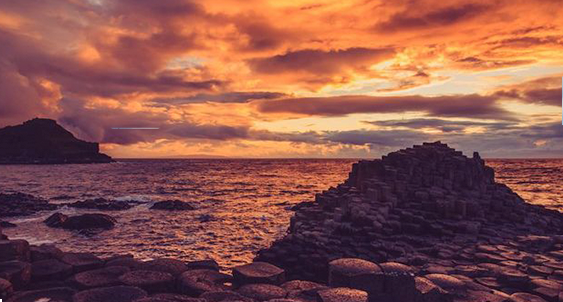Hi, my name is Derry 👋.
I love Irish history and all things related to genealogy.
It's well established that over 70 million people worldwide claim ancestry from Ireland.
If you are one of the lucky few, don't forget to join our Community group over on Facebook and share your story.
Take another giant leap step towards tracing Irish heritage by checking out our gently-paced Driftwood Small-Group Tours of Ireland.
For now, grab your notepad and get ready for my step-by-step guide to tracing your Irish roots!
👨👩👧👦 Step 1. Do Your Homework
Don't touch that laptop!
Before you even think about opening a search engine, try to get as much information as possible from any human resources you may have overlooked.
The first step in tracing Irish roots is to turn to your older relatives or people who knew them, if possible.
Grandparents.
Great aunts and uncles.
Parents.
Elderly neighbours.
Here is a list of information you should to try and gather from your folks:
- NAME. The full name of your Irish ancestor(s), including nicknames or birth names (for everyone) and maiden names (for married women).
- DOB. Your Irish relatives' approximate date of birth - even the year will help!
- PLACE. Place of origin in Ireland of your Irish family. Get as exact a place as possible, be it townland, parish, county or country (Republic of Ireland or Northern Ireland)
- RELIGION. The religion or religious denomination of your relative. For example, Protestant or Catholic, Anglican or Presbyterian.
- FAMILY NAMES. The full names of your Irish ancestors' spouse(s), parents, children or other family.
- EMIGRATION/IMMIGRATION. Where did your Irish relative arrive into your country? What port did they leave from? What was the ship's name?
- OTHER IMPORTANT EVENTS. Their date and place of marriage and/or death. These details were recorded historically and are searchable in public archives (as you shall see below).
The first three on this list are vital; the others will help make the task easier. But don't worry if you only have a name and a year to work with. Sometimes that's enough!
Once you've gathered a profile of information around your Irish ancestors, move onto Step 2.
🕵️ Step 2. Study Clues In Your Name
Your name says a lot about you.
The name of your Irish ancestor might not mean much on its surface. However, to someone like me, your family name will tell a story — or even multiple stories!
This is particularly true of Irish family names.
Here's a quick example...
My Own Name: Nairn
My paternal family name is Nairn.
It's not a name that crops up often in Ireland, even though my dad's side of the family have been here since the late 1600s.
If you look at a map of Scotland, you'll notice that one of the smaller counties/shires is called Nairn. There's also a town and a river with the same name.
So, in all likelihood, my ancestors came from Scotland originally. If I was trying to draw my family tree back to ancient times, I would be tempted to book a flight to Scotland first.
Here's a more detailed example...
The Back Story to the O'Sullivan Name
O'Sullivan (or its common spelling variant, Sullivan) is one of the top 3 Irish surnames globally.
The name in Irish is Ó Súillabháin. It originates from the Irish word súil (eye) and abháin (one). O'Sullivan literally means 'of the one-eyed' or 'of the hawk-eyed'.
In terms of geographical origin, O'Sullivan carries strong historical connections to the southwestern corner of Ireland, specifically West Cork and Kerry.
Even more specifically, O'Sullivans are forever linked to the Beara. The Beara is a remote and beautiful peninsula, located hundreds of miles from Dublin. It's about as far from what some might call 'civilisation' as you can get in Ireland.
Why is the Beara the land of the O'Sullivans?
It's largely due to the legend of the 'Prince' Dónal Cam O’Sullivan Beare, the last great Gaelic Chieftain of West Cork and South Kerry.
Our tours visit Dunboy Castle near Castletownbere, where Dónal and his people were besieged by British crown forces back in 1602. This event in turn led to O'Sullivan's March, a 500km flight northward that is commemorated today by the Beara-Breifne Way hiking trail.
If you have an O'Sullivan in your family record, West Cork in general, and the Beara in particular, would be a natural place to start searching.
It's a dramatic example.
But the point is that many Irish family names bear a connection to a specific place. Your name is a great place to start the hunt for your Irish roots.
🆓 Step 3. Use These Free Geneaology Tools
Lots of paid-for tools exist for finding records and tracing your DNA such as 23 And Me and Ancestry.com.
If you're even vaguely interested in tracing your Irish roots, then you're probably aware of, or have even tried, these premium genealogy tools. Most are excellent. But all cost money!
The good news?
No matter where you live in the world, there are several excellent FREE online genealogy tools you can use to trace Irish roots.
Here are my favourites...
National Archives of Ireland
The National Archives of Ireland website allows you to browse detailed records for the island of Ireland, free of charge.
These include censuses from 1821 to 1911, as well as military records and legal documents like prison records and wills.
The 1901 and 1911 census details cover the whole country while the earlier ones only cover certain counties.
Irish Genealogy
Irish Genealogy is a wide-ranging website that offers FREE searches in several historic public databases.
Included are church records (baptisms, marriages and burials) as well as civil records (births, marriages, deaths).
Enter your ancestor's name, press GO and see what comes up!
Dúchas - Irish Heritage
Dúchas.ie is the official Irish heritage site. There's a wealth of information available.
For example, the surname database is a simple but effective tool that offers spelling and Irish/Gaelic language variants of popular family names — very useful while engaged in genealogical detective work.
John Grenham
John Grenham's Irish Ancestors website pulls together name records from censuses and other historic sources.
You can search for FREE up to 3 times before being asked to register and/or pay. The results are displayed in an attractive, map-based format.
Family Search
Family Search pulls together records from several sources.
Global records are available for name searches, not just Ireland.
You have to register with your email address but you can find some great nuggets of information with this FREE account.
Ask About Ireland
AskAboutIreland.ie offers a FREE name-based search of Griffith's Valuation.
This is a register of property covering the specific dates 1847-1864.
🛬 Step 4. Visit These Dublin Libraries & Archives
After doing all that homework, you'll want to do some research on the ground in Ireland.
If you're lucky enough to be visiting Dublin, here are a few of my favourite places to further your Irish family roots research in Ireland's capital city:
The National Library
Step into the National Library of Ireland (NLI) in Kildare Street, Dublin for a great Irish family roots resource.
The National Library holds microfilm copies of parish registers up to 1880. The NLI offers a genealogy advisory service. It's also worth mentioning that the National Library building is spectacular.
General Registrars Office
You can access civil records on births, marriages, and deaths for the entire country at General Registrars Office in Werburgh Street.
If you need to see the hard copy, this is the place to go. Records go back to 1845.
Dublin City Archive
Another useful place to trace Irish family roots is the Dublin City Archive in Pearse Street.
As well as maps and census records, this archive holds copies of Thoms Directories, with household records in the Dublin area. First published in the 1860s, there is a copy for every year up to the present day.
EPIC Museum
Check out the EPIC Museum of Emigration in Dublin.
This attraction is not only a great genealogical resource and a fascinating visitor experience too, the EPIC Museum also offers personalised genealogical services for a free.
📚 Step 5. Genealogy Resources Outside Dublin
The vast majority of records relating to family history outside Dublin remain undigitised.
The only way to access them is by physically locating and reading them in-person (or, indeed, paying a consultant carry out that service for you).
If this sounds daunting, never fear!
Here are some of my favourite local archives, libraries and heritage centres that are useful for genealogy research and located outside Dublin:
The Roots Ireland website has two big selling points: it has a FREE and searchable database of Catholic Church records. But it also offers a map-based index of local heritage centres - often the best way to narrow down a search for an ancestor.
Local Libraries
Libraries in cities and towns around Ireland often hold excellent local records, as well as historical studies and primary source documents.
Find out more about Ireland's local library network.
Here is the equivalent library website for Northern Ireland.
Graveyards
Don't forget about graveyards! Ancient burial places are spread the length and breadth of Ireland.
If you've succeeded in narrowing your search to a local area, try visiting the local graveyards to gain more clues.
IrishGraveyards.ie has documented graveyards all over the island.
Here's a handy list of graveyard-related links from IrishGenealogy.ie.
🎯 Step 6. Widen Your Net Beyond Ireland
Any picture of Irish genealogy is complicated by the fact that, prior to 1922, the entire island of Ireland was part of the United Kingdom (UK).
Add to this...
- England and Scotland have been major endpoints for Irish immigrants over the centuries
- British ports such as Liverpool, Bristol and Plymouth were popular jumping off points for Irish immigrants leaving for North America and Australia
- The Treaty Ports — Lough Swilly, Berehaven and Spike Island — were not handed back into Irish control until 1938
What does all of this mean for your search?
It means British archives may hold data on Irish families that is otherwise not available in Ireland.
If you are visiting this side of the pond anyway, spend some time in UK archives if nothing has appeared in Ireland.
UK Public Record Office
The Public Record Office in the UK offers a free family history resource.
These include searchable records like census results, military records and passenger lists.
Public Record Office of Northern Ireland
If you know, or suspect, that your family originated in the six counties of Northern Ireland, check the website for the Public Record Office of Northern Ireland (PRONI).
Not everything is digitised but the site will point you in the direction of historical maps, censuses, business, school and hospital records.
Several important placename changes occurred post-independence. The port of Cobh was called Queenstown. The port of Dun Laoghaire was Kingstown. Offaly was King's County. Laois was Queen's County.
🙋 Step 7. Find A Friend, Ask A Friend
Stuck? Remember, you are not alone!
There's a massive community of fellow amateur genealogists out there.
More than likely, there are people asking similar questions to you. Or maybe there's someone who has already solved the Irish roots riddle you're stuck on.
Who to ask?
Join our friendly community group on Facebook.
You'll find over 6,500 friendly past guests and fans of Ireland. Everyone chats, asks questions and shares stories, with dozens of new members joining each week.
🧱 Step 8. Go Pro!
If you've reached a brick wall in your research, don't be afraid to reach out to a professional genealogist or a premium family roots service.
Genealogists are specialists in family detective work. They will unearth clues that you might miss.
Read about the detective work undertaken by a professional genealogist.
What Else Should I Know?
- The prefixes O or Ní or Mc or Mac were sometimes dropped or adopted, depending on if someone was trying to sound more or less Irish. So it might be useful to try searching for your name with/without these prefixes.
- Exact names and dates of birth may not always match up. This can be for a variety of reasons. The most reliable way to confirm the identity of someone is to get their parents' names. As it is unlikely that two people of the exact same name would have had a child with the same name at a particular time and place.
- It can be a good idea to broaden your search around a particular ancestor. This will make it easier to cross-reference any facts relating to them. As discussed previously, facts may not always match up.
- If you can't find the information you need in a centralised location, churches can be a great place to turn to. It is best to contact them in advance of turning up. Please be aware that the primary role of churches is not to provide genealogy services. Be polite and consider giving a small donation for their time.
Good Luck!
I hope this quick start guide to tracing your Irish family roots was useful.
Start your genealogy research and you never know what you'll unearth!











